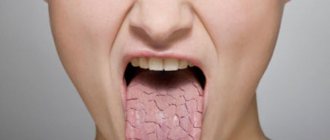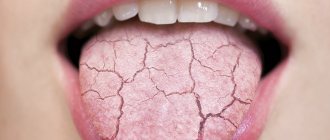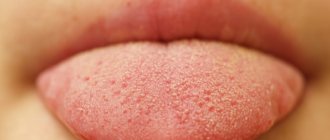Dry mouth is an unpleasant sensation that can be a symptom of serious illnesses. If dry mouth occurs constantly or frequently, it is necessary to understand the cause that is causing it and, if necessary, begin treatment. Elimination of dry mouth, as a rule, is achieved only as a result of treating the underlying disease, which should be the true goal. In any case, the feeling of dry mouth is another reason to pay attention to your health.
Dry mouth is caused by insufficient hydration of the oral mucosa, mostly due to insufficient saliva production. In medicine, dry mouth caused by a cessation or decrease in saliva production is called xerostomia.
.
Quite often, dry mouth occurs in the morning or at night (that is, after sleep).
Symptoms associated with dry mouth
Dry mouth in most cases manifests itself as a complex of symptoms described as:
- "viscosity" or "stickiness" in the mouth;
- thirst;
- irritation of the oral mucosa (burning and itching), the appearance of a bright border of the lips, cracks on the lips and in the corners of the mouth;
- dry tongue. The tongue turns red and becomes rough. It becomes more difficult to speak, chew and swallow. Decreased taste perception;
- dry throat. The voice becomes hoarse and more hoarse;
- there is an unpleasant odor from the mouth.
Causes of dry mouth that are not pathological
In some cases, dry mouth is not associated with a medical condition. For example:
- Dry mouth can occur in the morning and at night due to intoxication. This is a typical situation after drinking too much the night before.
- When nasal breathing is impaired, a person breathes through his mouth during sleep. The mouth is slightly open, and the oral mucosa dries out faster. Nasal breathing can be impaired due to a runny nose, nasal polyps, or a deviated nasal septum. A similar situation occurs with snoring. The cause of snoring in most cases is a decrease in the tone of the soft palate. Muscle weakening develops with age. This is why older people snore more often, and their oral mucosa becomes dry. This reason explains dry mouth in the morning in the elderly in most cases.
- If you don't drink enough fluids in hot weather, you shouldn't be surprised by dry mouth. A similar effect can be caused by eating highly salted foods.
- Many medications can cause dry mouth.
- Smoking is another common cause of dry mouth.
- Dry mouth can be one of the symptoms of menopause.
Treatment approaches depending on the cause
Depending on the causes of dry mouth and other associated symptoms, the following treatment approaches are used:
- If your blood pressure is low, you should consult a therapist. And at home, you can use such remedies as ginseng, Chinese lemongrass, rosea radiola , etc. In some cases, a mug of aromatic coffee helps patients.
- In case of stress and physical fatigue , it is recommended to get a good night's sleep . You can take a sedative with a sedative effect ( Afobazol, Persen, peony tincture, Novo-passit , etc.). In severe cases, it is necessary to consult a neurologist.
- In case of head injuries and brain diseases , the patient needs emergency medical care , as the situation can be fatal. The choice of medications and treatments depends on the nature and severity of the pathology. Therapy is prescribed after a diagnostic examination (MRI, CT scan of the brain, etc.).
- For gastrointestinal diseases , it is recommended to consult a gastroenterologist. He will refer you for the necessary examinations and, depending on the diagnosis, select treatment tactics. For severe cramps and pain in the stomach, you can take a tablet of Ibuprofen, Ketorol, Tempalgin , etc.
- In case of poisoning , first of all it is necessary to cleanse the body of toxins and other harmful substances that cause the disease (bacteria, fungi, viruses). To do this, you need to drink as much clean water as possible and use enterosorbents (activated carbon, Lactofiltrum, Enterosgel, etc.). If after a couple of hours the patient’s condition does not improve, you should call an ambulance.
- For cerebral vascular spasm drugs that improve blood circulation are used . Medicines are selected by a neurologist on an individual basis after the necessary examinations.
- For osteochondrosis , to relieve pain, it is recommended to lubricate the affected area with an anti-inflammatory agent (Fastum-gel, Chondroxide, etc.) or take a painkiller (No-shpa, Nise, Ketorol, etc.). But in the future you need to contact a neurologist.
- During menstruation, take an anesthetic or antispasmodic (No-spa, Ibuprofen, Spazgan, etc.). After this, visit a gynecologist and find out the cause of these symptoms.
- During pregnancy, it is prohibited to take any medications without first consulting a doctor.
For diseases of the cardiovascular or respiratory system, as well as in the case of stroke, meningitis and brain tumors, the patient is indicated for hospital treatment.
Diseases that may cause dry mouth
Dry mouth can be caused by high fever and intoxication due to various infectious diseases (flu, sore throat, etc.). Diseases associated with large loss of fluid as a result of vomiting or diarrhea (cholera, dysentery) can also cause dry mouth. In such cases, dry mouth is one of many symptoms and does not attract special attention.
If dry mouth is combined with diarrhea, flatulence, belching, nausea and pain in the left side of the abdomen, then this may indicate pancreatitis.
Dry mouth in combination with a bitter taste, heartburn, white or yellow coating on the tongue can indicate diseases of the gastrointestinal tract such as gastritis, duodenitis, cholecystitis.
Dry mouth can also occur with:
- diseases of the salivary glands;
- endocrine diseases (diabetes mellitus, thyrotoxicosis);
- neoplasms of the oral cavity (benign and malignant);
- damage to nerve endings that contribute to the functioning of the salivary glands;
- anemia;
- vitamin A deficiency;
- systemic diseases (scleroderma, Sjogren's disease, cystic fibrosis).
Possible reasons
For your information! A set of symptoms such as dry mouth, nausea, weakness and drowsiness, as well as dizziness can bother a person for the following reasons:
- Osteochondrosis (usually the cervical or thoracic spine). In this case, accompanying symptoms will be a crunching sound when turning the head or the entire body, numbness of the limbs. Headache, fainting, and decreased joint flexibility may occur. There is a feeling of chronic fatigue (especially after performing physical activities), etc.
- Spasm of blood vessels in the head caused by impaired blood flow. Associated symptoms: ringing or noise in the ears, disorientation in space, speech impairment, pain in the eyes.
- Poisoning from food, chemicals or alcoholic beverages . When poisoned by various substances, dry mouth, nausea, weakness and dizziness are complemented by symptoms such as diarrhea and vomiting. Rapid shallow breathing, dilated pupils, pale skin, chills, convulsions, drowsiness, etc. are possible.
- Head injuries (for example, caused by a fall or during a fight). In this case, the main symptoms will be supplemented by the following signs. These are short-term but frequent loss of consciousness (literally for a few seconds), acute or aching headache. There is noise or ringing in the ears, vomiting, bleeding from the nose and ears (with severe head injuries). There may be clouding of consciousness (including hallucinations, delusions, etc.), the presence of bruises on the face and neck.
- Pregnancy or menstruation period . Both of these phenomena are accompanied by hormonal imbalance. They are characterized by additional symptoms such as pain in the lower abdomen or lower back, vomiting, fatigue and lethargy. Characterized by swelling of the mammary glands, high blood pressure (not observed in all cases), bloating, slight increase in body temperature, mood swings, etc.
- Overdose of drugs. Associated symptoms: stool disorders (constipation or diarrhea), headache of varying intensity, skin rash, abdominal pain, loss of appetite, lethargy, etc.
- Severe physical fatigue and stressful situations. Such conditions may be accompanied by headache, insomnia, and an increase or sharp decrease in blood pressure. May be accompanied by trembling in the limbs, deep breathing, excessive sweating and exacerbation of chronic diseases.
- Hypotension (low blood pressure). In this case, dry mouth, nausea and weakness are complemented by symptoms such as acute headache or migraine. Possible paleness of the skin (especially on the face), a pre-fainting state (up to loss of consciousness).
- Brain tumors of various types. In this situation, it is possible to have both an asymptomatic course of the disease (in the initial stages) and with a full set of characteristic symptoms (in addition to dry mouth, nausea, etc.). For example, the patient may have convulsions, severe headaches, poor coordination, double vision, and vision problems.
- Meningitis. Associated symptoms: acute headache, lack of appetite, persistent thirst, sudden fever. There may also be increased photosensitivity, skin rashes, inability to straighten your legs, and complete impotence.
- Stroke and pre-stroke condition. A stroke is most often accompanied by symptoms such as numbness in the arms or legs, vomiting, and spots before the eyes. Temporary blurred vision, numbness of half the face, slowed speech rate, and impaired muscle tone may occur.
- Diseases of the gastrointestinal tract (pancreatitis, gastric and duodenal ulcers, etc.). Gastrointestinal pathologies are characterized by the following symptoms: vomiting, bitterness in the mouth, stool disorders (constipation, diarrhea), etc.
But this is only a small list of diseases accompanied by dry mouth, dizziness, nausea and weakness. In reality there are many more.
One way or another, only a doctor can establish the true cause of this pathological condition.
Stay up to date! Dry mouth combined with a bitter taste in most cases indicates the release of bile into the gastrointestinal tract, some of which penetrates the esophagus.
Also, dryness in combination with weakness and dizziness can be a sign of hypoglycemia (severe decrease in plasma glucose), anemia, vegetative-vascular dystonia, autoimmune diseases (Sjogren's syndrome, etc.).
Eliminate dry mouth
If dry mouth is caused by drinking alcohol and smoking, then it can only be eliminated by getting rid of the bad habit. It is recommended to reduce the consumption of salty and sweet foods. Pay attention to how you breathe - through your nose or mouth. If nasal breathing is difficult, the cause must be diagnosed and nasal breathing restored. To do this, you will have to see a doctor. It is also important to monitor the humidity in the room.
Dry mouth can be the first symptom of many diseases. Therefore, if you often experience a feeling of dry mouth, it is necessary to understand its nature, determine the cause and, if necessary, consult a doctor and begin treatment for the disease that caused this symptom.
Why may shortness of breath and fever be added?
In addition to the main symptoms, shortness of breath and fever may be added.
This happens for various reasons, but most often it is caused by diseases of the cardiovascular and respiratory systems.
Heart diseases
Note! The most dangerous heart pathologies are myocarditis, endocarditis and pericarditis (inflammatory processes).
They are characterized by the following accompanying features :
- chest pain;
- increased blood pressure;
- swelling;
- cough;
- fatigue;
- pale skin;
- temperature increase;
- dyspnea;
- disruptions in the functioning of the heart (it sometimes freezes, sometimes it seems that it is about to “jump out” of the chest).
also characterized by a full set of the above symptoms (except for temperature) .
Keep in mind! This is an extremely dangerous heart disease, manifested by pressing pain in the center of the chest. It is otherwise called “angina pectoris”.
Pathologies of the respiratory system
Among the diseases of the respiratory system, which are usually associated with inflammatory or tumor processes in the lungs and bronchi, there are:
- Pneumonia is an infectious and inflammatory disease of the lungs. At the same time, it is difficult for a person to inhale and exhale. Plus, the process is accompanied by a severe cough, weakness, dry mouth and a sharp increase in body temperature.
- Bronchitis is a disease of the lower respiratory tract. It is characterized by an inflammatory process in the bronchial mucosa. The symptoms in this case are almost the same as in the case of pneumonia. However, the person feels much lighter and does not suffer from high fever (with rare exceptions).
- Lung tumor - in addition to the above symptoms, it is characterized by hemoptysis and severe cough.
Remember! Pathologies that cause shortness of breath and fever are not limited to this list.
Inflammatory cardiovascular diseases, as well as pneumonia and lung tumors (or suspicion of them) require immediate medical attention or calling an ambulance. Self-medication is unacceptable.
Which doctor should I contact for dry mouth?
If you complain of dry mouth, you can contact your dentist or general practitioner (GP or family doctor). After identifying the cause that caused the feeling of dryness, you may be redirected to an endocrinologist, gastroenterologist or rheumatologist.
Most likely, you will need to undergo various tests (general blood count, general urinalysis, blood test for thyroid hormones, biochemical blood test, serological test), and, if necessary, undergo some instrumental studies (ultrasound, radiography, computed tomography).










